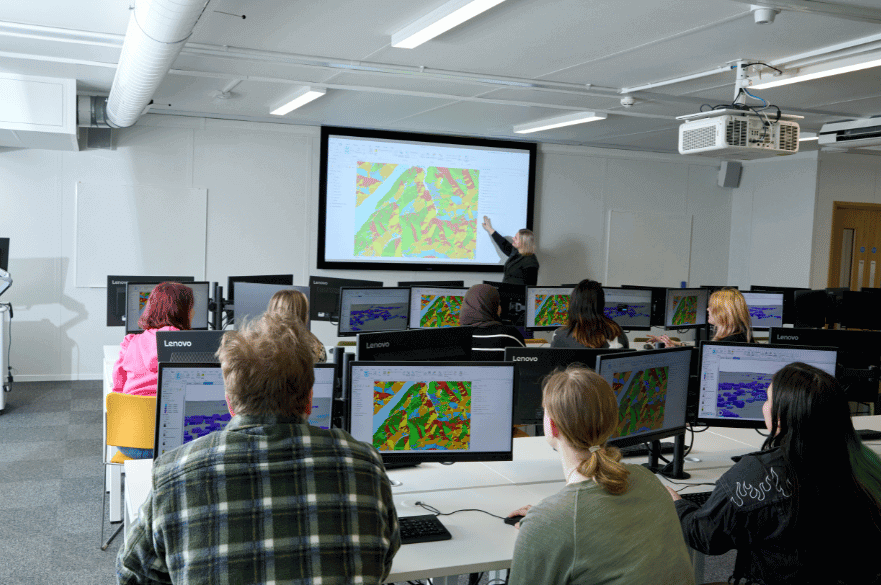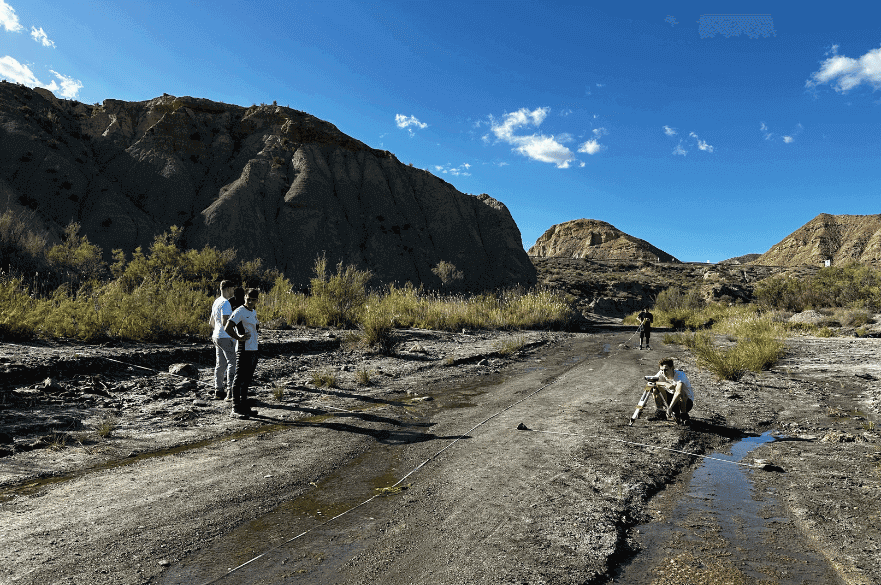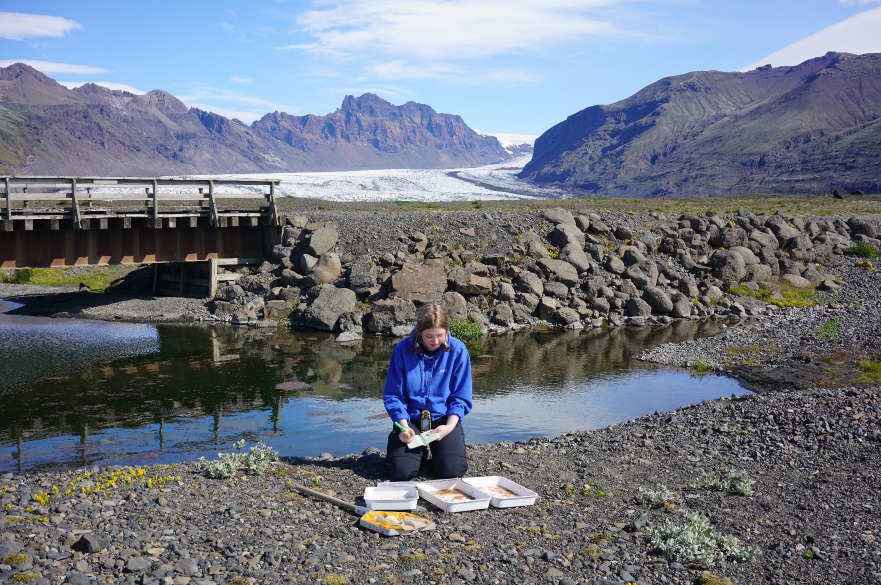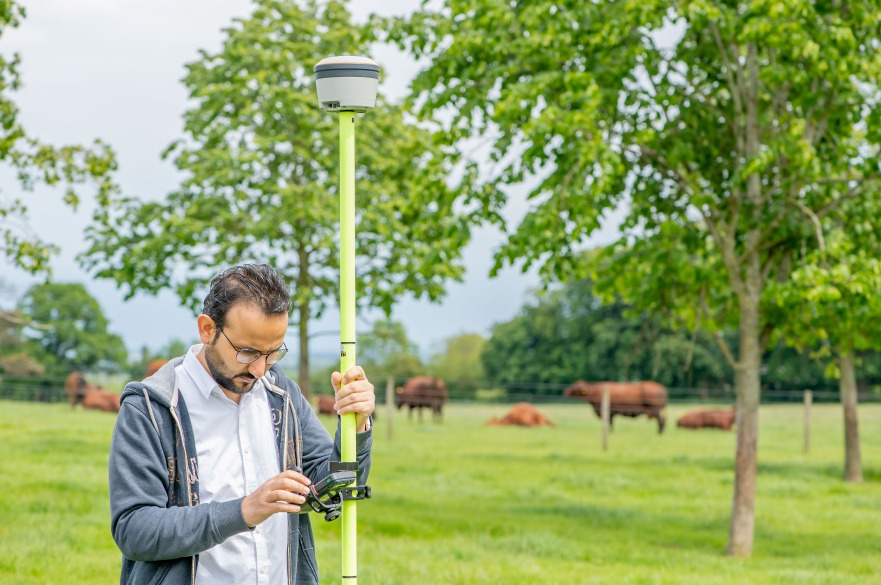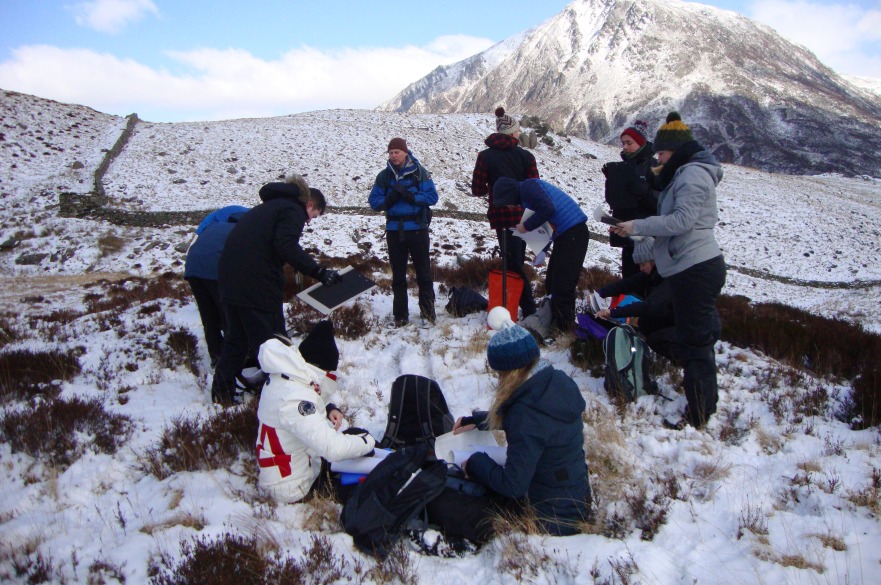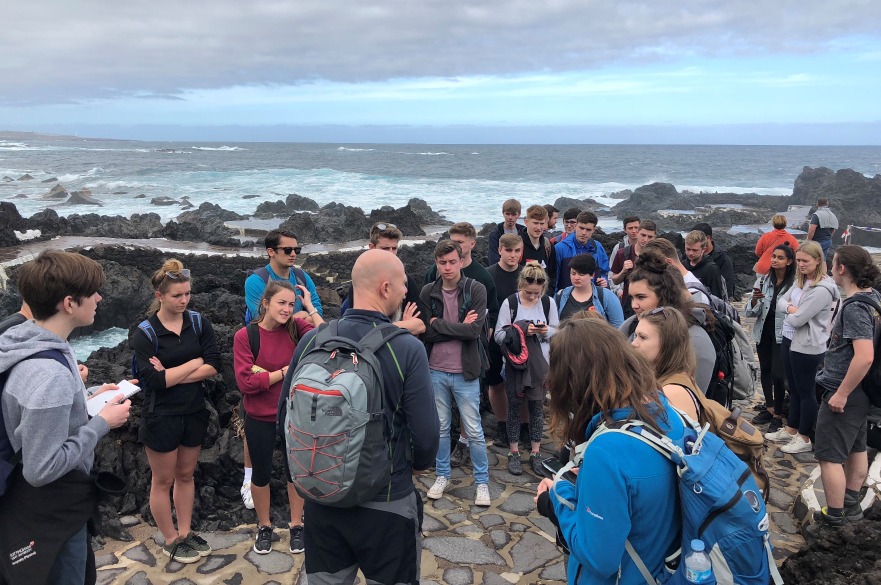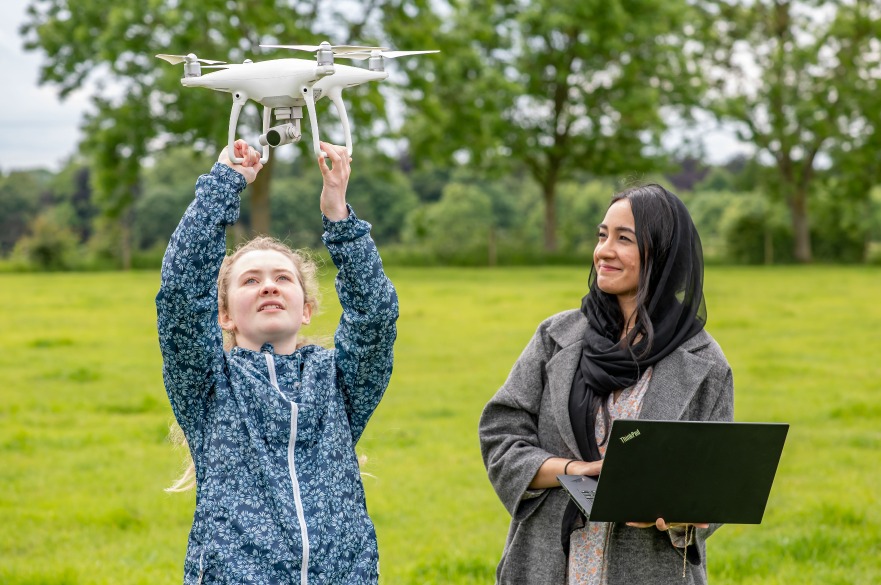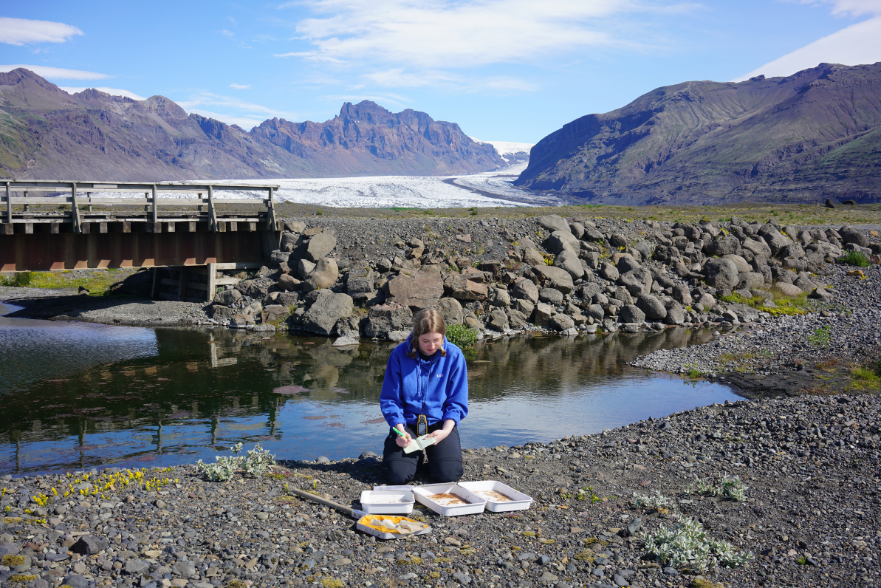This course is in Clearing
Offers from 80 tariff points
About this course
Disaster relief, the climate crisis, diminishing resources, and social inequity: where others see questions, geographers find answers. Our course attracts everyone from the environmentally curious to the ecologically inspired; people who are naturally passionate about how humans interact with the environment, and vice versa. With us, you won’t just learn how the world works — you’ll find out how to make a meaningful difference to it.
Delivered at our stunning Brackenhurst Campus, this highly practical degree is packed with fieldwork, trips and opportunities to get your hands dirty. Geography’s a broad discipline, and that’s why you’ll be able to choose what areas of geography you study – your degree, your choice. You could complete an industry placement on the sandwich route, and study in locations such as Australia or Canada as part of our international exchange programme. We’ve built this course around exciting real-world experiences, because we think you should graduate with more than just a qualification.
Geography students are prized for their versatility, and the subject has one of the UK’s highest employment rates. You’ll develop an impressive portfolio of technical and transferable skills, becoming a natural writer, and an inquisitive researcher who’s great with data. Our grads work as everything from environmental risk assessors to sustainability consultants, from corporate roles in big multinationals to on-the-ground disaster aid with NGOs. With a great geography degree, your choices are almost endless!
We also offer BSc (Hons) Geography (with foundation year). Our integrated foundation degrees offer a unique gateway to our BSc courses for those who currently don't meet the degree-level entry criteria.
What you’ll study
The course focuses on environmental geography. Those environments can be physical, and they can be cultural — the societies we have built, and the Earth they exist upon. We’ll look at the issues that define these different worlds, plus the key trends and connections that bind them all together.
Along the way, there’ll be domestic and international trips, plus constant fieldwork at Brack – our own 200-hectare outdoor classroom. In the past, we’ve explored the volcanic moonscapes of Tenerife, visited the rolling countryside of north Wales, and taken fresh perspectives on some renowned UK destinations. We have adopted and signed the Royal Geographical Society (with IBG) Principles for Undergraduate Field Courses.
The course culminates in a dissertation: your own independent study project, inviting you to take a deep dive on a subject of your choosing. You can do this on home soil, or venture further afield — previously, our grads have conducted their projects in places as varied as California, Texas, Iceland, and Italy.
Whatever your preferred route, our range of elective modules gives you a genuine opportunity to personalise your studies in line with your own ambitions. You’ll customise your degree experience by choosing from areas such as:
- managing natural hazards and disasters
- agriculture and food security
- the global climate emergency
- sustainable development
- natural resource management
- inequality and social justice
- GIS and remote sensing
- renewable energy
- land degradation and desertification.
Study with us, and you’ll graduate as a truly global citizen, with worldwide geographical perspectives. Our course is theoretically rigorous, but also very hands-on. We’ll build up your confidence by encouraging you to try new things. As well as landscapes at home and abroad, you’ll explore your own mind, as you examine what it is to be a geographer, and why the subject matters. But most of all, you’ll be part of a genuine and inclusive community — even getting the chance to work with our own academics on real research projects.
Here’s a detailed, year-by-year breakdown of the modules you’ll study:
Geographies of Global Change (20 credits)
Explore the geopolitical and cultural framework in which the world moves today, and investigate trends, transactions and patterns in environmental governance. Topics include globalisation, the geography of trading, and the changing status of women in the global economy.
Weather and Climate (20 credits)
Explore the Earth's climate system, weather patterns and the ways in which these are being altered by human activity to cause the global climate emergency.
Geographical Fieldwork (20 credits)
Develop problem-solving skills in a range of issues in human and physical geography. Gain an awareness of different environments, both locally and overseas. Fieldwork has previously been undertaken both in the UK and in the province of Almería, south-east Spain.
Geodiversity (20 credits)
Learn about the Earth’s surface systems, processes and geology and develop your understanding of how the physical landscape is shaped.
Practical and Professional Skills (20 credits)
Develop an understanding of the range of skills required in Geography, such as geographical data collection, data analysis and report writing.
Global Environmental Issues (20 credits)
Study contemporary global environmental issues and their underlying causes, including how humans impact the environment and how the natural environment impacts human society.
Principles and Practice in Geography (20 credits)
You’ll use a number of case studies – including a local one you’ll conduct yourself – to become familiar with, and learn the key approaches and issues associated with, practising geography.
Geographical Information Systems and Spatial Analysis (20 credits)
Study the mapping and analytical techniques used in geographical information systems (GIS). Explore the applications of technology across a wide range of topic areas.
Global Climate Emergency (20 credits)
Climate change and our response to it is arguably one of the most pressing issues affecting the earth in modern history. In this module you will address the impacts of climate change on ecosystems, food production, water resources, energy use and many other issues. The module focuses on the science and perceptions of climate change, and how we respond and adapt to it.
Introduction to Research (20 credits)
Explore the principles of research methods, focusing on data collection, analysis, and interpretation. You'll look at experimental design, literature evaluation and hypothesis testing, preparing you for undertaking independent research as part of your final year dissertation.
You'll also choose two optional modules.
Sustainability (20 credits)
Explore the meaning of sustainability and how this impacts our relationship with the natural world. You’ll learn about the conflicts that persist within this between rich and poor countries, those that wish to exploit resources and those that wish to conserve them. You'll also look at the development needs of current and future generations.
Natural Hazards and Disasters (20 credits)
This module explores environmental hazards which directly threaten human life or economic well-being. You’ll examine their physical causes and social impacts alongside assessing the threats they pose. You'll also explore the actions needed to manage the aftermath of environmental hazards and reduce disaster potential.
River Dynamics and Management (20 credits)
Understand the controls and process-form interactions within river systems, together with the applied aspects of river management. Via a combination of lectures, practical sessions and fieldwork you will undertake surveys and monitoring in river environments. You'll examine how to link theory to practical application and how this fits in with current national and international concerns with regard to river dynamics.
International Development and Social Justice (20 credits)
You'll critically explore international development by looking into the histories of development and the relationship between development and colonialization. This will involve unpacking the links between contemporary international development discourse, foreign policy, and social justice.
Environmental Change (Fieldwork) (20 credits)
This module covers aspects of environmental change that have taken place during the parts of the Quaternary Period, which is the last c. 2.6 million years of Earth’s recent history, and through to contemporary environmental change. This includes landscape evolution, challenges managing a national park, and evolving energy generation sources in the context of the UK’s carbon emissions. The delivery of the module is currently via residential fieldwork, previously undertaken in north Wales.
This is a placement year for students on the four-year course
Dissertation (40 credits)
Undertake independent research under supervision. Focus on your own area of interest within geography.
Contemporary Topics in Geography (20 credits)
You'll combine your learning on the course and your wider experience to delve deeply into a social or environmental issue that matters to you. Develop ideas that could be used to positively impact an organisation grappling with this issue and reflect on your future aspirations and employability.
You'll also choose three optional modules.
Natural Resource Management (20 credits)
Throughout this module, you’ll study the exploitation of natural resources in a range of environments. You’ll also explore both the scientific principles and political, economic and social structures needed to explore the management of natural resources.
Drylands (20 credits)
Drylands embrace a number of environments, ranging from sandy deserts to temperate grasslands and savannas. This module explains why the myth that drylands are empty, barren places with little economic value is flawed and explores their global socio-economic importance.
Global Agriculture and Food Security (20 credits)
Gain an insight into the global agricultural industry and investigate the concepts of production in agriculture, forestry and fisheries. You’ll learn about the current agricultural practice and policy in the UK and EU, investigate current scientific advances, explore issues relating to harvesting and production of food from sustainable sources, and consider global food security.
Applications of Remote Sensing (20 credits)
This module will build on your knowledge of managing geographical information learnt in your first and second year. You’ll learn how to process, analyse and interpret information from a range of existing remote sensing techniques. You'll also obtain information for mapping and spatial analysis using data from both historical and the very latest high-resolution sensors.
Energy for a Low Carbon Future (20 credits)
Investigate how to harness and distribute safe, clean energy from sources that do not deplete with use. Consider the depletion of fossil fuels and the increasing demand for energy and evaluate the choices available for the future.
Glaciers and Glaciation (20 credits)
Develop your understanding of glaciers and ice sheets in the context of current climate change. You'll also look at the importance of glaciers and ice sheets from both a hazards and resource perspective. A key aspect in the delivery of this module is the practical use of data sets from currently glaciated environments such as Svalbard, Iceland, and the Alps.
We regularly review and update our course content based on student and employer feedback, ensuring that all of our courses remain current and relevant. This may result in changes to module content or module availability in future years.
Don’t just take our word for it, hear from our students themselves
Student Work
Video Gallery
How you're taught
Compared to other institutions, we’ve got a great sense of community at Brackenhurst. Our classes are smaller, our bonds are tighter, and it’s a more personal learning experience — one delivered on friendly, first-name terms.
As well as regular lectures, you’ll be learning through group exercises, seminars, and hands-on practical work. As the course progresses, a range of optional modules give you the opportunity to coordinate your studies around your main interests and career goals. Throughout the course, you’ll also enjoy one-to-one support from your own dedicated personal tutor.
This course is about looking at the bigger picture, so we take a cross-disciplinary approach. You’ll work with a range of specialists and take different approaches, so you can cover every basis and dig deep into the areas that interest you most. To minimise the jump from uni to the professional world, you’ll have day-one access to industry-standard tools and technology, including specialist GIS software, a geospatial computer room, and plenty of on-site fieldwork at our beautiful, expansive Brackenhurst Campus. At NTU, our equipment is for teaching and learning — not just research.
Please note that field trip locations may vary and are subject to availability and change.
How you're assessed
Our students love the range of assessment methods offered on this degree. They’re designed to accommodate every learner’s strengths, and to reflect the range of different ways you’ll work with stakeholders in the real world. From writing reports and delivering presentations, to sitting both seen and unseen exams – we keep our assessments fresh and relevant.
If you choose to complete a placement, you’ll take it between Years Two and Three of your course.
Careers and employability
Your future career
You'll graduate with transferable skills, including numeracy, teamwork, analytical and laboratory skills, putting you ahead of the graduate employment market.
90% of our BSc (Hons) Geography graduates are in work or further study within 15 months of finishing their degrees
(of those available for work or study, latest Graduate Outcomes Survey 2021/22).
Our graduates have gone on to work in roles with companies as diverse as:
- ADC Infrastructure
- Chubb Marine Underwriting
- BrewDog
- the Environment Agency
- in national and local government
- non-governmental organisations (NGOs).
Geographers are employed in a vast array of roles including:
- aid coordinators
- project managers
- environmental consultants
- risk assessors
- hydrologists
Placement opportunities
During the course you have the option to take on a placement for at least 38 weeks. This would take place between the second and third year of study. This can lead to a Certificate or Diploma in Professional Studies.
Previous students have undertaken placements at organisations like:
- The Environment Agency
- Wildlife Trusts
- Nottingham City Council
- The Forestry Commission
NTU Enterprise
You'll also have the opportunity to turn your ideas into a viable business with help from NTU Enterprise, NTU's purpose-built Centre for Entrepreneurship and Enterprise, a support centre to help students create, develop and grow their own businesses.
Campus and facilities
As a dedicated home for our animal, rural and environmental science courses, the Brackenhurst Campus has a character all of its own. From the population of almost 2,000 students and staff to the animals themselves — cats and cattle, sheep and horses — it’s all about community. Relax with a coffee in the Orangery; kick back with your coursemates in the Brack Bar; enjoy the peace and quiet of our Victorian walled garden or Eco-Library; grab a pal and wander through 500 acres of stunning countryside.
The rural campus, which acts as an outdoor classroom, is the perfect place to put theory into practice. From geographical information system (GIS) mapping and renewable energy solutions, to flood prevention and weather monitoring, there are a huge range of professional tools, technology and facilities on your doorstep.
Our Brackenhurst Campus sits on the doorstep of Southwell: a picture-perfect market town filled with rustic pubs, cosy cafés, and boutique shops. A little further afield, and served by reliable buses that run late into the night, you’ve got Nottingham — one of Britain’s top 10 student cities, and one of Europe’s top 25. It’s stuffed with history, culture, and well-kept secrets to discover at your leisure: enjoy lush green spaces, galleries, hidden cinemas and vintage shopping by day, and an acclaimed food, drink and social scene by night.
Entry requirements
This course is in Clearing
Looking for a place in Clearing? We are accepting application and would love to hear from you!
UK students
This course is in Clearing
Looking for a place in Clearing? We are accepting applications and would love to hear from you!
Clearing requirements
From 80 UCAS tariff points from up to 4 qualifications.
To discuss our entry requirements and see what we can offer you, call us now on +44 (0)115 848 6000. Alternatively, if you already have your qualifications, apply online via our Clearing Application form.
Preparing for results day? Beat the queue and sign up for NTU Priority for up-to-date information about all things Clearing. You’ll get an offer ahead of Clearing, subject to you achieving the required grades on results day.
Additional requirements
For this course we require an A-level, or equivalent, in Geography or a relevant Science.
We accept the following Science subjects: Environmental Studies, Environmental Science, Geology, Biology, Chemistry, Physics and Mathematics. We will also accept History. We also consider science modules as part of BTECs and other qualifications.
To find out what qualifications have tariff points, please use our tariff calculator.
Additional requirements for UK students
There are no additional requirements for this course.
Contextual offers
If you don’t quite meet our entry requirements, we might be able to make you a lower offer based on a range of factors, including your background (such as where you live and the school or college you attended), your experiences and your individual circumstances (you may have been in care, for example). This is called a contextual offer, and we get data from UCAS to help make these decisions. We do this because we believe everyone with the potential to succeed at NTU should have the opportunity to do so, no matter what barriers you may face.
Meeting our entry requirements
Hundreds of qualifications in the UK have UCAS Tariff points attached to specific grades, including A-levels, BTECs, T Levels and many more. You can use your grades and points from up to four different qualifications to meet our criteria. Enter your predicted or achieved grades into our Tariff calculator to find out how many points your qualifications are worth.
Other qualifications and experience
NTU welcomes applications from students with non-standard qualifications and learning backgrounds, either for year one entry or for advanced standing beyond the start of a course into year 2 or beyond.
We consider study and/or credit achieved from a similar course at another institution (otherwise known as credit transfer), vocational and professional qualifications, and broader work or life experience.
Our Recognition of Prior Learning and Credit Transfer Policy outlines the process and options available for this route. If you wish to apply via Recognition of Prior Learning, please contact the central Admissions and Enquiries Team who will be able to support you through the process.
Getting in touch
If you need more help or information, get in touch through our enquiry form.
International students
This course is in Clearing
Looking for a place in Clearing? We are accepting applications and would love to hear from you!
Clearing requirements
From 80 UCAS tariff points from up to 4 qualifications.
To discuss our entry requirements and see what we can offer you, call us now on +44 (0)115 848 6000. Alternatively, if you already have your qualifications, apply online via our Clearing Application form.
Preparing for results day? Beat the queue and sign up for NTU Priority for up-to-date information about all things Clearing. You’ll get an offer ahead of Clearing, subject to you achieving the required grades on results day.
Additional requirements
For this course we require an A-level, or equivalent, in Geography or a relevant Science.
We accept the following Science subjects: Environmental Studies, Environmental Science, Geology, Biology, Chemistry, Physics and Mathematics. We will also accept History. We also consider science modules as part of BTECs and other qualifications.
Additional requirements for international students
If you need help achieving the academic entry requirements, we offer a Foundation preparation course for this degree. The course is offered through our partner Nottingham Trent International College (NTIC) based on our City campus.
English language requirements
View our English language requirements for all courses, including alternative English language tests and country qualifications accepted by the University.
If you need help achieving the language requirements, we offer a Pre-Sessional English for Academic Purposes course on our City campus which is an intensive preparation course for academic study at NTU.
Other qualifications and experience
If you have the right level of qualifications, you may be able to start your Bachelors degree at NTU in year 2 or year 3. This is called ‘advanced standing’ entry and is decided on a case-by case basis after our assessment of your qualifications and experience.
You can view our Recognition of Prior Learning and Credit Transfer Policy which outlines the process and options available, such as recognising experiential learning and credit transfer.
Sign up for emails
Sign up to receive regular emails from the International Office. You'll hear about our news, scholarships and any upcoming events in your country with our expert regional teams.
Getting in touch
If you need advice about studying at NTU as an international student or how to apply, our international webpages are a great place to start. If you have any questions about your study options, your international qualifications, experience, grades or other results, please get in touch through our enquiry form. Our international teams are highly experienced in answering queries from students all over the world.
Policies
We strive to make our admissions procedures as fair and clear as possible. To find out more about how we make offers, visit our admissions policies page.
